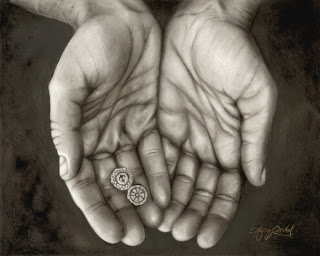Questions for going deeper with the Scriptures for Sunday, July
8th
Greatness. It’s what many in our society strive for, on a certain level
it’s the American dream. But what
makes a person great? Wealth?
Accomplishments? Relationships?
Possessions? Achievements?
Diplomas? Having your wedding announced in the New York Times Sunday
edition? The encounters in today’s
passage wrestle with the notion of greatness in Jesus’ day. The example was the religious
leaders. Those that weren’t great
were the everyday poor. Things
don’t seemed to have changed much, except that in on our culture today rare is
it that the religious leaders define greatness with their example. What makes the church so great? – at
least historically? And why do we
struggle with that today?
These
encounters of Jesus sparring rhetorically with the religious leaders of his
day, specifically the scribes, tease out the theological questions of
greatness, importance, and power.
How is what Jesus says about status and value similar and different than
the way in which our world, or human culture views them?
Jesus
summarizes the 10 commandments – and the 613 laws (or mitzvots) of the First
Testament with two. How does that
resonate with you? What is Jesus
saying about in terms of the importance or value of our actions, thoughts and
passions? How does what we do or
think matter in terms of the universe and the daily existence of others? How is doing what Jesus asks us living
in a way that makes us not far – or even in – the kingdom of God?
Textual Curiosities:
The
story of the Greatest Commandment Mark 12:28-34 is one of the best known
regarding Jesus. Commonly called
the Golden Rule it points back to the 10 commandments, which are listed twice
in the Bible: in Exodus 20:1-17 and Deuteronomy 5:1-22. The summary of Jesus points to the Shema (which is the Hebrew word for
“hear” – the first word in the text) in Deuteronomy 6:4-12. This became the dominant Jewish
confession of faith. Jesus then combines
it with the commandment of Leviticus 19:18 to show that love for neighbor is a
natural and logical outgrowth of love for God.
What
does it mean in verse 34 when Jesus says that the man is not far from the
kingdom of God? How is his
response and reasoning different than that of the Sadducees in Mark 12:18-27?
Verses
35-37 retell a curious way of doing exegesis or philosophical reasoning. Jesus is quoting Psalm 110:1 in an
effort to explain that the Messiah, or Lord, doesn’t have to be son of David. This is curious because elsewhere in
Mark Jesus is identified correctly as the Son of David, by blind Bartimeus in
Mark 10:47-48 and the jubilant crowd in Mark 11:9-10. How then do we reconcile this passage with those early
statements? Is Jesus saying
something different? Or is it the
way in which the same message is being said in a different way that seems
incoherent? Jesus is arguing that
the Messiah, or Lord, if he’s the son of David, is also at the same time the
Lord of David. The word Lord is being
used, as it was in that day, to represent authority, elder respect, paternal
relationships and as a messianic title – all in a few phrases. Why would Jesus be arguing against the
scribal assertion that the Messiah has to be a particular way?
Verse
38-40 is a stern warning of the false example of piety and ethical action by
the religious leaders. What Jesus
is referring to is that the teachers of the law were also like judges and
lawyers. In the case of the death
of a man they would legally represent the widow. Jesus is implying that some of them abuse their position,
charging or taking more than they should.
Throughout the prophets and the Psalms God is repeatedly identified as
the God of the orphan, the widow and the foreigner. Widows have a special place in the theology of how God sides
with the people of the margins.
What is Jesus warning against in this passage?
The
last verses, 41-44 lifts up the reverse example of piety, ethical actions or
lived-out faith. The widow gives
the smallest coins that existed, from her great poverty there is great
generosity whereas from the seemingly great wealth of the teachers there is
only great stinginess that is created.
Questions for wondering and
exploring:
• What
is Jesus saying to us and our church community today about how we profess and
live out our faith? How do you
apply this teaching to us? How is
it culturally deviant? How does
the church need to be in the world of today?
•
How might we be more creative – intentional – or subversive in how we love our
neighbor as an extension of how we first love God? How do you seek to love your neighbor through your passion,
intelligence, skills and time?
What difference does it make?
How have you (or haven’t you) experienced this service of others as a
spiritual practice or an experience of the presence of God? How would you like to?
• Is
their a third way to following Jesus and his teachings in life that is between
the rigid dogmatic stance of fundamentalism and the laxist hyper-reductive
progressive desire to not offend or exclude anyone? How does Jesus speak to this challenge of living our faith
in Jesus in 21st century East Bay in his summary of the will of God
through love and service?

No comments:
Post a Comment